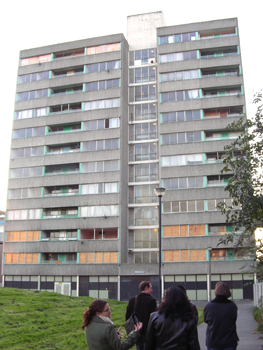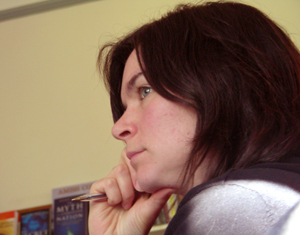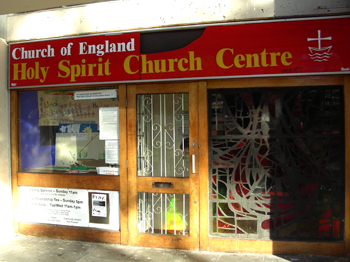Blaine Detweiler, Lakeview
detwiler@nep.net
On the fourth day of our London journey after Charlie and Sarah had put their three young children to bed, the four of us adults took up an energetic conversation. Charlie is a pastor who along with his wife Sarah were giving Matt Hamsher from Pacific Southwest Mennonite Conference and me the benefit of their waning hours of Sunday work. Nearing 10:00 and sensing the tone of conversation had gone irretrievably theological in nature, Sarah smiled and excused herself for the night. Before she left, Matt and I thanked them both for their hospitality. I related to them my best understanding of ‘hospitality’ being one in which both ‘guest’ and ‘host’ come away from a table being richer from the experience and that for my part, at least, I could say that my three days with them in their London house had been rich indeed.
Earlier that day I accompanied Sarah and the children to worship at Holy Spirit Church Centre on Ferrier Estate. Church of England is its official registry but through a unique arrangement Charlie Ingram, a Baptist, provides leadership to this congregation. Charlie explained to me the term ‘estate’ in British parlance is an area defined by similar housing units. Ferrier Estate is a section in south London on which government funded housing units were built to accommodate low income residents. Built with the Utopian ideals of early 1970’s Ferrier Estate his since fallen into a state of decline, both structurally and socially.
Charlie admitted his inspiration for serving on Ferrier Estate came from Jesus’ own lips, about preaching ‘good news to the poor…’ words that provoked a near riot in those gathered for a pleasant Sabbath in Nazareth (Luke 4:16-30). He is keenly aware of the accumulative effect on the human spirit that prolonged neglect can have; how suspicions arise and how alternative lifestyles emerge when the life of a community, its stores and services, close their doors. Noises echo off the vacant buildings which surround Holy Spirit Church Centre but Charlie is committed to his community and determined their church be a place of blessing to those who profoundly need one.
While Charlie is purposed and measured in his demeanor, Sarah, displays unusual calm given the circumstances. They long agonized but then decided for safety reasons and for the sake of young children to purchase a house within brief walking distance off the Estate. As Sarah readied her three children all under the age of five for the Sunday walk to church she displayed an almost ‘holy’ composure. None of the dangers Charlie earlier related to us such as robbery, general hooliganism and the progression of knives to guns on Ferrier Estate seemed to deter Sarah and the children from their purpose.
Sarah’s poise reminds me of Mary, Jesus’ mother, who, for all of what we can garner, took with assurance the news of God’s pregnancy. When I looked at Sarah and Charlie I gained a real sense of the radical risks involved with the kingdom of God and I gained confidence for any future absurdities I may be confronted with at Lakeviewor at Franconia Conference. I took from the table of Charlie’s and Sarah’s hospitality a clear impression of Jesus’ words ‘do not be afraid’ and can only wonder what I might have given them in return.
This learning trip was designed to explore and better understand the present unfolding phenomenon dubbed ‘post-Christendom.’ English author Jonathan Bartley refers to its precedent ‘Christendom’ as ‘an arrangement’ or a ‘ power structure’ and as having ‘a culture’ of its own. Christendom is the marbling of Jesus’ gospel with the power brokers of a given political system. As such, Christianity has long been granted ‘pride of place’ within the functioning of an empire and has long been assumed to be of great benefit to the state. However, in many settings that place of privilege is shifting and we’re entering a new and unsettled age.
On day two of our journey, several of us boarded a red double-decker bus towards our appointed meeting time with Jo Frew. She had just gotten off work and when the nine of us had gathered in the street she scouted the neighborhood for her choice of a suitable meeting place. It turned out to be the rear of a rather noisy pub. After ordering, we sat down to eat and to hear her talk about her work with SPEAK, a network of young people with a bent for prayers and fairness and the kingdom of God. Jo sat in the center of our table. One other person sat between us but I could not hear Jo. I bent my ear and strained to no avail. A pub is an active place and the din proved to be the winner that night. Jo is a pensive, soft spoken woman. She did not force the issue.

In Jo, I saw a spiritual presence, a posture I saw represented in others we met as well. If ‘Christendom’ favored ‘dominance’ and ‘compliance’ what I saw in her and others differed considerably. Where ‘Christendom’ sought order and preferred visible delineated structures, what I began to see was more fluid and engaging. Where Mennonites in the US have been more keen on
properly maintained boundaries of community and theology and would much prefer to meet in areas set aside for sacred activities, Jo took us to a pub. It seemed to matter not so much where we met but whom we were with. I took note. Anabaptists in the UK are a series of networks, people connected by e-mail, interest and Jesus. Dotted throughout their land from London to Lockerbie, from Oxford to Bristol all the way to Northern Ireland is a network of learning communities. Anabaptism in the UK is more of a verb than a noun, a movement seemingly born by search. I got a real sense that UK Anabaptism lives, as a movement, a verb, acting very consistently with something Jesus once said about the kingdom, that it is like “…yeast a woman took and mixed in with three measures of flour until all of it was leavened.†Seeing Jo Frew, dressed in a mottled ensemble of colors, seated in the rear of a London pub may press for some the matter of ‘post-Christendom’ past comfortable, but for me it was a focused picture of church on the margins. It was a reminder that although Jesus went to local synagogues and to Jerusalem’s large temple, the places he so often showed up at were because of people already there. We must not forget that.
 It is Jesus talk. I know Jesus didn’t say it, but many of the Christians I saw in the UK lived into their post-Christendom disadvantage, graciously. I saw in the Ingrams’ and others a truly attractive approach to their work. If asked to account for the buoyant spirit of the folks we encountered on this journey, I would guess it has to do with their status. In ‘Christendom’ the issue was citizenship. ‘Post-Christendom’ is the birth pangs of a new and unsettled world, but it comes with a healthy recognition that, in the realm of God, one is a pilgrim, with freedom and confidence to be on the move.
It is Jesus talk. I know Jesus didn’t say it, but many of the Christians I saw in the UK lived into their post-Christendom disadvantage, graciously. I saw in the Ingrams’ and others a truly attractive approach to their work. If asked to account for the buoyant spirit of the folks we encountered on this journey, I would guess it has to do with their status. In ‘Christendom’ the issue was citizenship. ‘Post-Christendom’ is the birth pangs of a new and unsettled world, but it comes with a healthy recognition that, in the realm of God, one is a pilgrim, with freedom and confidence to be on the move.
The opinions expressed in articles posted on Mosaic’s website are those of the author and may not reflect the official policy of Mosaic Conference. Mosaic is a large conference, crossing ethnicities, geographies, generations, theologies, and politics. Each person can only speak for themselves; no one can represent “the conference.” May God give us the grace to hear what the Spirit is speaking to us through people with whom we disagree and the humility and courage to love one another even when those disagreements can’t be bridged.
